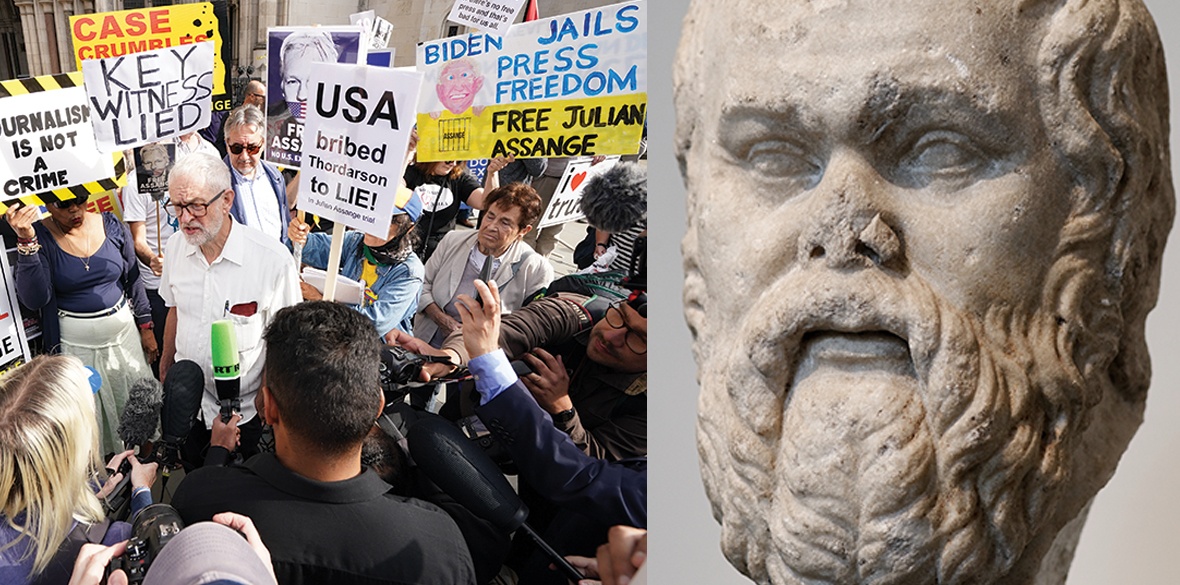This is the last article you can read this month
You can read more article this month
You can read more articles this month
Sorry your limit is up for this month
Reset on:
Please help support the Morning Star by subscribing here
WHAT is termed the Classical Greek period lasted around 200 years (5th and 4th centuries BC), the period that saw the greatest florescence of Greek culture, dominated largely by the city state of Athens.
Much of the early defining politics and thinking of that period — architecture, sculpture, philosophy, science, and drama — had a powerful influence on the later Roman empire and became the foundation of Western civilisation. We still refer to Greece for inspiration and for examples of civilised living.
A unified Greek state as we know it today was non-existent at that time, and what is termed “Greek” was largely Athenian, as the city state of Athens was the dominant force in that region.
The peak of Athens’ hegemony saw the flourishing of Greek democracy, first introduced by the reforms of its poet and law-giver, Solon, in 594 BC. He curtailed the powers of the wealthy and aristocratic, devolving power to the general populace.
This democracy was extended only to Athenian citizens, at the time numbering around 60,000, with double that number of slaves, ie two slaves for every Athenian citizen.
Athenian hegemony spread over much of what is, today, Greece proper, as well as a large part of present-day Turkey, Sicily, and parts of north Africa. This city state enjoyed an extended period of material wealth, intellectual exploration, and relative peace, although this didn’t prevent it conducting wars on a regular basis against other city states, notably Sparta and the island oligarchies.
Athens’ wealth and domination of the region endowed it with a stability and sense of unconquerability. This, together with its democratic structures, facilitated a blossoming of radical thinking. It produced its most famous philosopher, Socrates (c470–399 BC) whose thinking challenged the accepted ideas and predominant gods. Such ideas were tolerated because the city state felt safe.
Only after Athens’ defeat by Sparta in 404 BC did this once all-powerful city state begin falling apart and Socrates’s ideas become more than a mild irritant. He once said: “Strong minds discuss ideas, average minds discuss events, weak minds discuss people.”
He would be put on trial in 399 BC and condemned to death by his fellow citizens. Other dissident thinkers were also executed or driven into exile.
Thinking about the demise of Greek civilisation made me reflect on our own period. I recall wandering through Greek villages only a decade ago and seeing old peasants straightening old and rusty nails, in order to reuse them to repair their ramshackle houses, cobblers and copper smiths still employing the methods of 2,000 years ago. Such images conjured up a vision of where Britain could end up in future decades unless we choose to learn from history.
Just as Greek democracy and its material wealth was built on slavery, so have modern Western democracies and our relative affluence been based on the virtual slavery of their own working classes and, even more so, the brutal exploitation of other peoples, even though at arm’s length.
Both here in Britain and in the US we are already living through a period of decline, the disintegration of buoyant capitalism, unified cultures and consensual thinking. The challenges to capitalist hegemony are increasingly rattling the elites which have become more intolerant of divergent ideas and protest, and are introducing draconian, anti-democratic legislation in a futile attempt to shore up their own hegemony.
The persecution of those like Julian Assange are so reminiscent of the treatment of Socrates in ancient Greece. Or compare today’s fortress mentality, the stirring up of xenophobia and hatred of “the other” with the tolerance shown towards the likes of Marx and Engels being readily granted asylum at the height of Britain’s imperial dominance.
If we re-examine the classical periods of Greece and Rome, as well as civilisations since, we can see clearly that greed, the urge to dominate and gain supreme power has bequeathed us almost continuous war, fuelled by hatred and fear and characterised by utmost brutality.
These wars have not only seen the mass killing of generation after generation of young people and of our cities and great architectural achievements but have never achieved their supposed aims of bringing lasting victory and peace.
Among the world’s species, it is only humans who conduct senseless extermination of their fellow beings. The recent TUC resolution on increasing Britain’s so-called “defence” spending, demonstrates once again how even the trade union movement has not learned basic truths.
Can’t we finally learn how to live together without going to war? Perhaps a proper exploration of classical civilisations and their demise as well as the history of war could assist us in countering these self-destructive and suicidal tendencies?










